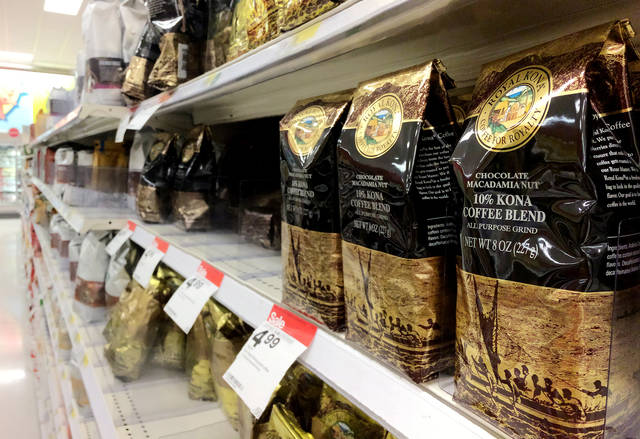KAILUA-KONA — A measure originally intended to change labeling requirements for coffee blends died quietly with a few passing words Tuesday morning.
“There was tons and tons of opposition testimony and some concerns from the Department of Agriculture, so the recommendation is to defer (the bill) indefinitely,” said Sen. Rosalyn Baker (D-Maui), chair of the Senate Committee on Commerce, Consumer Protection and Health.
House Bill 144 HD 1 SD 1 in its initial form would have required any roasted or instant coffee labeled “Kona Blend,” or with other origin points like Kauai or Ka‘u listed on the packaging, to contain product at least 51 percent by weight from the advertised region. The current requirement is 10 percent.
But the measure set aside by Baker Tuesday wouldn’t have accomplished the labeling goals for which Hawaii Island coffee farmers have fought for nearly 30 years. After cruising through the House of Representatives, its purpose more or less in tact, HB 144 was substantially altered via the gut and replace tactic sometimes employed by state legislators.
The Senate Committee on Agriculture and Environment (AEN), chaired by Sen. Mike Gabbard (D-Oahu) and vice chaired by Sen. Russell Ruderman (D-Puna), was the first to hear the measure on the Senate side.
AEN changed the purpose of the bill from altering labeling requirements to charging the University of Hawaii Economic Research Organization (UHERO) with conducting a three-year study on the economic impact such a law would have on the coffee industry. Amendments also mandated a task force comprised of industry representatives review the study and make legislative recommendations.
Bruce Corker, a member of the Kona Coffee Farmers Association (KCFA) Board of Directors and an ardent supporter of changing labeling requirements, said coffee growers largely saw AEN’s move to alter the bill’s intention as a stall tactic favoring corporate blenders and processors.
Gabbard disagreed with Corker’s characterization, saying he and his committee need more information on overall economic impact to the 40-plus million dollar Hawaii coffee industry before making a determination.
“There has not been a recent study done that would give us the data,” Gabbard said. “(This issue is) highly emotional, two different sides, everyone going at each other’s throats. And that’s why after a discussion with my committee, (we decided) let’s get more data. It wasn’t just kicking the can down the road as some have accused us of doing.”
Coffee farmers have questioned the Legislature’s seriousness about even pursuing a study let alone ever changing labeling requirements. Critics like Corker pointed to written testimony offered by UHERO Tuesday, which requested its name be removed from the bill as it didn’t feel equipped to manage the scope and complexity such a study would demand.
UHERO would have been appropriated $250,000 for the study, Gabbard explained, which would have allowed the organization to hire a consultant to assist in the work.
For its part, KCFA isn’t interested in such a study, saying as much in its own testimony. Corker said enough research has been done to prove farmers’ points, noting a quote from a paper published in 2018 by the Food and Agriculture Organization of the United Nations and the European Bank for Reconstruction and Development that was part of the first draft of HB 144.
The quote states simply that the Kona coffee brand “does not enjoy any strong protection of its name.” Farmers feel as though it’s the responsibility of the state to protect that name, and that the government is failing to do so.
Phyllis Shimabukuro-Geiser, chairperson of the Board of Agriculture, testified asking the Legislature to amend HB 144 from its original form saying certain parts of the measure “…would place an extreme hardship on the blending industry” and “would be very costly to a business.”
She testified in favor of the measure once it was gutted and replaced with mandates for a three-year study and a task force.
“I have significant concerns that the Hawaii Department of Agriculture sided with the blenders … and that is unfortunate,” Corker said. “The Department of Agriculture should be supporting farmers, not the processors and the blenders.”
Whatever economic impacts may come about if labeling requirements were to change, Gabbard agreed the current paradigm is probably of greater benefit to blenders and processors than it is to farmers.
Raising the labeling requirements to 51 percent would likely necessitate higher production costs for blenders, as beans like Kona Typica demand a higher price than most others, or would result in reduced retail prices and profits as blenders couldn’t capitalize on various name brands associated with Hawaii.
Shimabukuro-Geiser in her testimony referenced a departmental study from 2006 that found blending creates a larger market for Kona coffee by making it more affordable and “…that the quantity supplied of pure Kona coffee is reduced by the amount used for blending which, in effect, creates a positive pressure on the price of pure Kona coffee.”
Farmers, however, see the practices of blenders as diluting the brand in an effort to deceive and increase profits at the expense of both farmers and consumers.
Vincent Mina, president of Hawaii Farmers Union United, wrote in testimony the language of the amended HB 144 “…sounds reasonable, but it ignores the decades of Hawaii Legislative and County findings that the 10% blending standard is ‘consumer fraud’ and ‘inherently deceptive and misleading.’”
“We respectfully submit that these are the only analyses that are needed,” Mina continued.
Gabbard and Corker both said they expected some version of the bill to be back with the Legislature next session.









